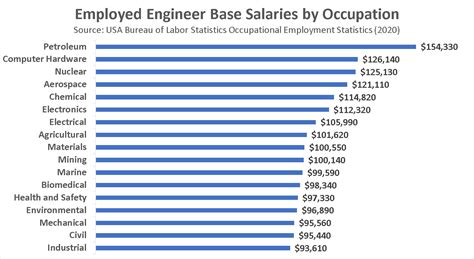Engineering is a broad field that encompasses a wide range of disciplines, from civil engineering to electrical engineering to software engineering. As a result, the salaries of engineers can vary significantly depending on their specialty, experience, and location.

Average Salaries for Engineers
According to the U.S. Bureau of Labor Statistics (BLS), the median annual salary for all engineers was $100,980 in May 2021. The top 10% of earners made more than $162,190, while the bottom 10% earned less than $56,310.
Highest-Paying Engineering Specialties
The highest-paying engineering specialties include:
- Software engineering: Median annual salary of $110,140
- Electrical and electronics engineering: Median annual salary of $105,090
- Chemical engineering: Median annual salary of $104,910
- Civil engineering: Median annual salary of $87,060
- Mechanical engineering: Median annual salary of $87,370
Factors that Affect Engineering Salaries
Several factors can affect the salary of an engineer, including:
- Specialty: As mentioned above, the highest-paying engineering specialties tend to be those that require specialized skills and knowledge.
- Experience: Engineers with more experience typically earn higher salaries than those with less experience.
- Location: Salaries for engineers can vary depending on the location of their job. For example, engineers in large metropolitan areas tend to earn higher salaries than those in rural areas.
- Employer: The type of employer can also affect an engineer’s salary. For example, engineers who work for government agencies tend to earn higher salaries than those who work for private companies.
- Education: Engineers with higher levels of education typically earn higher salaries than those with lower levels of education.
Benefits of Engineering
In addition to their high salaries, engineers enjoy a number of other benefits, including:
- Job security: Engineering is a field with high demand, so engineers can typically find stable employment, even during economic downturns.
- Growth opportunities: Engineers have the opportunity to advance their careers through promotions and specialized training.
- Creative challenges: Engineers are constantly solving problems and developing new solutions, which can be a rewarding and fulfilling experience.
- Social impact: Engineers play a vital role in society by designing and building the infrastructure that we rely on.
Pain Points of Engineering
While engineering is a rewarding career, it is not without its challenges. Some of the pain points that engineers face include:
- Long hours: Engineers often work long hours, especially during crunch times.
- Stress: Engineers are often under pressure to meet deadlines and deliver high-quality work.
- Complexity: Engineering projects can be complex and challenging, which can be stressful for some engineers.
Why Engineering Matters
Engineering is essential to modern society. Engineers design and build the infrastructure that we rely on, including our roads, bridges, buildings, and power plants. They also develop new technologies that improve our lives, such as medical devices, computer software, and transportation systems.
How to Become an Engineer
To become an engineer, you will need to earn a bachelor’s degree in engineering from an accredited university. After graduation, you will need to pass the Fundamentals of Engineering (FE) exam. Once you have passed the FE exam, you will be eligible to become a licensed professional engineer (PE) after four years of experience.
FAQs
1. What is the job outlook for engineers?
The job outlook for engineers is expected to be excellent over the next decade. The BLS projects that employment of engineers will grow by 7% from 2020 to 2030, faster than the average for all occupations.
2. What are the different types of engineering jobs?
There are many different types of engineering jobs, including:
- Civil engineers design and build infrastructure, such as roads, bridges, and buildings.
- Electrical and electronics engineers design and build electrical systems, such as power plants and computer networks.
- Chemical engineers design and build chemical plants and processes.
- Mechanical engineers design and build machines, such as engines, cars, and airplanes.
- Software engineers design and build software systems, such as operating systems and web applications.
3. What are the qualifications for becoming an engineer?
To become an engineer, you will need to earn a bachelor’s degree in engineering from an accredited university. After graduation, you will need to pass the Fundamentals of Engineering (FE) exam. Once you have passed the FE exam, you will be eligible to become a licensed professional engineer (PE) after four years of experience.
4. What are the career advancement opportunities for engineers?
Engineers can advance their careers through promotions and specialized training. Some engineers may also choose to pursue a master’s degree or doctorate in engineering.
5. What are the benefits of a career in engineering?
A career in engineering offers a number of benefits, including:
- High salaries
- Job security
- Growth opportunities
- Creative challenges
- Social impact
6. What are the challenges of a career in engineering?
A career in engineering can also be challenging. Some of the challenges that engineers face include:
- Long hours
- Stress
- Complexity
